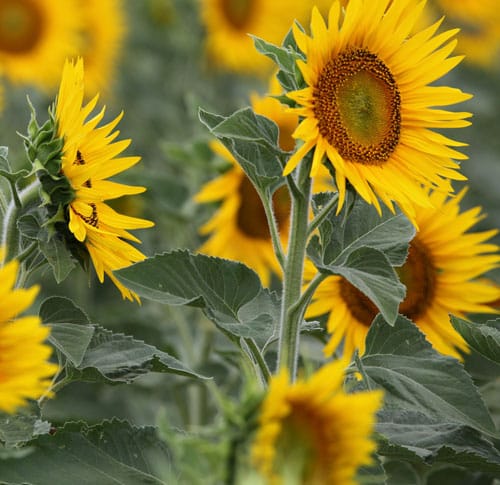Sunflowers dealing with water and heat stress
- Expertise, Solution, Sunflower
Water and heat stress are core to seed research. Water has always been a valuable asset in agriculture and with climate change the issue of adaptation becomes crucial for the sustainability of crops. If stress is not anticipated, the consequences on yield can become critical: increase in internal plant temperature, closure of stomata, interruption of gas exchange and photosynthesis and therefore total blockage of plant function. RAGT endeavours to respond quickly to the needs in the field: hardier varieties which are capable of avoiding or better adapting to periods of stress.
Knowing the behaviour of varieties in arid areas
The study of the responses of different varieties of sunflower to water and then heat stress, common in certain production areas, has led RAGT to dedicate a specific testing network to this subject. The international experimentation network for southern Europe studies the behaviour of varieties exposed to very high heat stress, particularly during flowering. “We need to know the behaviour of our varieties in regions where sunflowers are a major crop such as Andalusia, Turkey and other Black Sea regions. This allows us to select the varietal profiles best suited to these extreme production areas, and to anticipate the effects of climate change”, explains Manon Libert, sunflower product expert.

The technical development network: a trial network to characterise and select varieties for each production area
The challenge is quite simple: to be able to formalise advice on the behaviour of sunflower varieties, and their agronomic potential, depending on the geographical area of the farmer, from the most restrictive to the most intensive. “Sunflower is a resilient, robust and all-encompassing crop”, continues Manon Libert. “It offers many perspectives in a context of climate change. However, it is necessary to be able to position the right varietal profiles for a given production area beforehand, and this requires precise characterisation of each variety: disease profile, yield potential, precocity, hardiness, etc. Our technical development network is essential and must be representative of all the conditions in which sunflower is grown, whether in arid areas or in the most favourable situations”.

